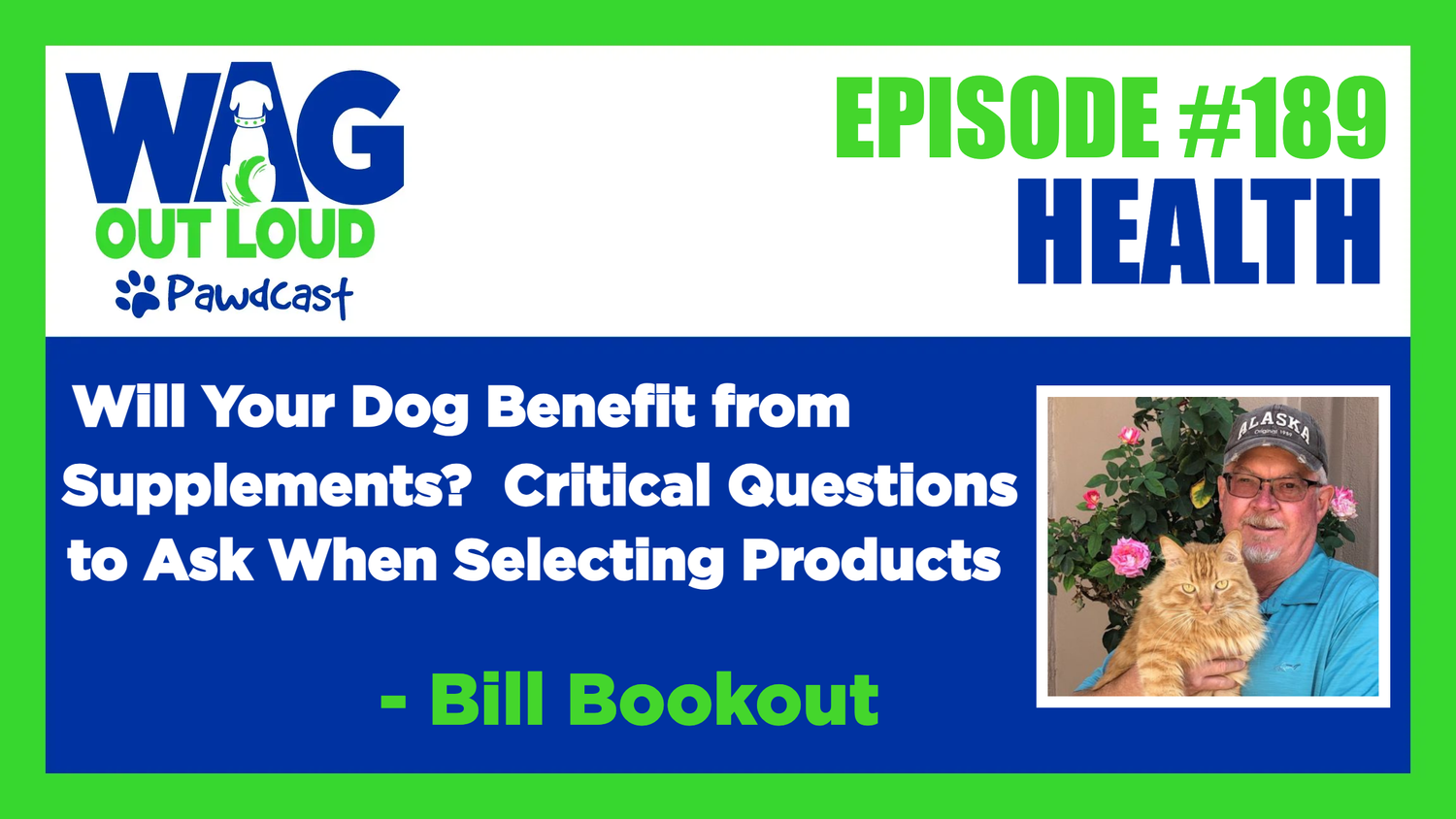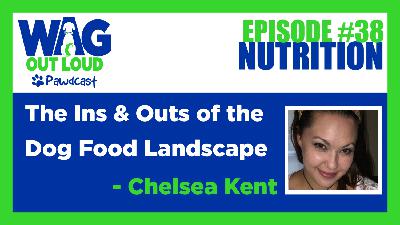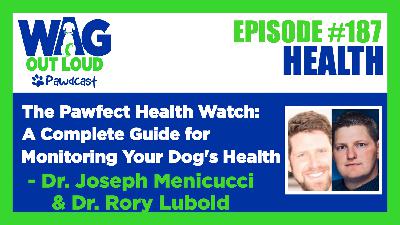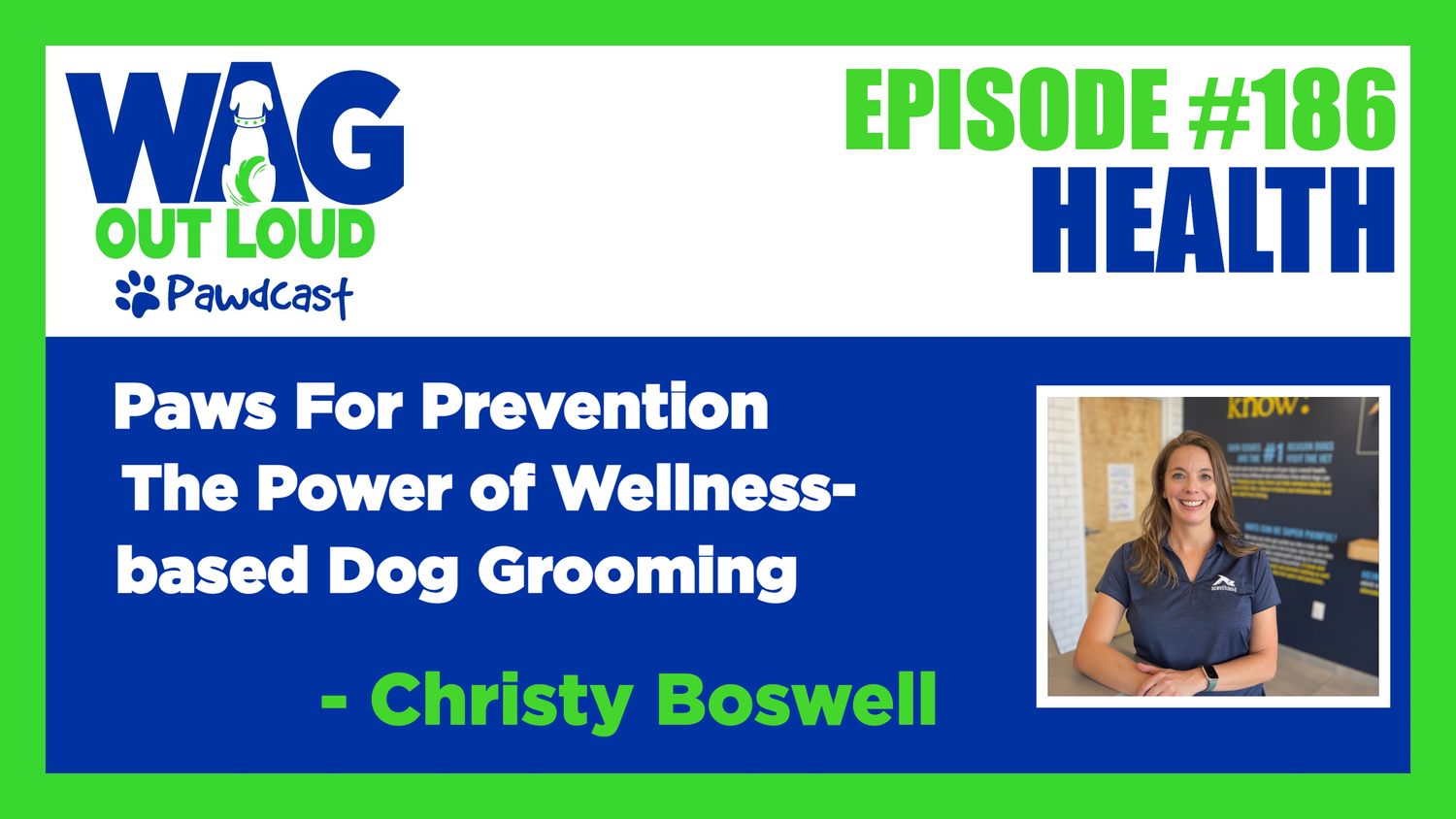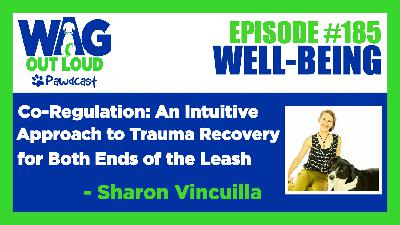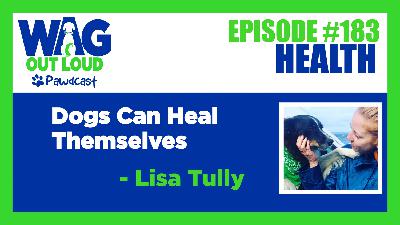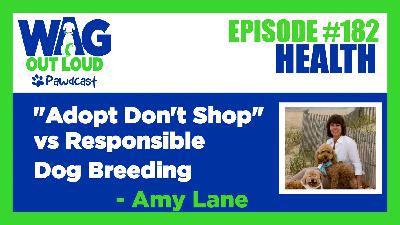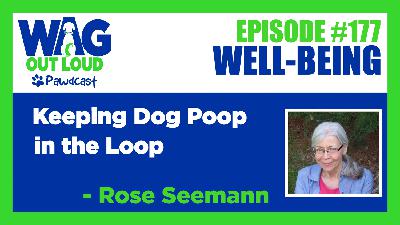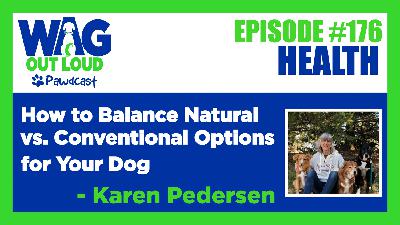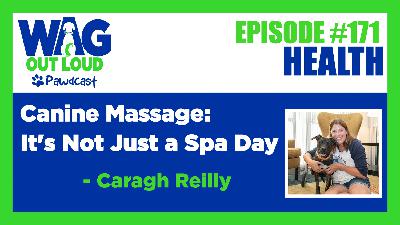Will Your Dog Benefit from Supplements? Critical Questions to Ask When Selecting Products
Update: 2023-12-06
Description
Hello This is Krista with Episode #189, the final episode of the Wag Out Loud pawdcast. And I just want to thank you for tuning in over the years and for wanting to be the best advocate for your dog's health and wellness. I have learned so much from all of my expert guests over the last five years and I hope that you have too many of you know that for the past year I've been working alongside Dr. Judy Morgan, as the Education and Development Team Lead for her Naturally Healthy Pets team. And Dr. Judy is America's best known natural pet advocate, and holistic veterinarian for over 38 years, and I help produce her podcast and manage her events and also manage her speaking engagements. Dr. Judy's experience includes holistic veterinarian, acupuncturist, chiropractor, food therapist, author and speaker. So if you don't currently follow her, you should! Follow Dr. Judy Morgan's Naturally Healthy Pets and continue your journey to learning more about how to keep your dog healthy and happy, naturally. And in the meantime, my Wag Out Loud website will remain up. So you can always listen to any of the podcast episodes. Check out my most trusted brands, most of them with discount codes. And check out the great information on the resources page. Again, thanks everybody for listening to the Wag Out Loud pawdcast. And I hope that you enjoy this final episode. Take care dog lovers!
Welcome to the Wag Out Loud pawdcast, where we are obsessed with bringing you helpful tips on canine health care, nutrition, and overall wellbeing. If you'd like to support the show, check out the amazing online events, products and resources that I personally recommend on the Wag Out Loud website. I'm your host, Krista and I'm super excited to be bringing you yet another tail wagging episode.
Well, hello dog lovers and welcome to yet another Wag Out Loud episode. And this is actually going to be the last and final episode, where we have a chance to learn something new when it comes to Canine health. And I'm so excited for today's guest. We have Bill Booko ut here. And he's going to be covering the topic of will your dog benefit from supplements and the critical questions to ask when selecting products. Bill, thank you so much for being with us today.
Krista, Thank you very much for the opportunity. I've been looking forward to this since we scheduled it. I’m sad that this is last podcast but I'm honored to be the final episode. So I really appreciate it.
This is so fitting. Bill, I'm going to ask you to introduce yourself and share why did you start the NASC, the National Animal Supplement Council?
THE START OF THE NASC
Kind of an interesting story. I'll make it brief. I'm a business executive. So I was COO for a $500 million dollar medical device and drug company but I was raised in Wyoming and I had dogs my whole life. So I've been an animal lover. I had two black labs, Lancelot and Cinder and they both had health issues. Cinder had hip dysplasia. Lancelot had cancer. So in the mid 1990s, I had them both successfully treated, I made a career change. I got out of human medicine and I took a slot as CEO for the third largest specialty animal referral center in the US. When cancer came back the second time around on my own dog, Lancelot. He was an 11 and a half year old Labrador Retriever. And he was given a very poor prognosis. So I'm connected with all these high powered board certified oncologists. And you know, he's given three months with chemotherapy. And I'm just not going to do that on an 11 and a half year old dog, so I'm looking for help. So I find a veterinarian, formulated a product and changed his diet completely. And he lived two and a half years good quality of life, which wasn't long enough. But out of that experience, I decided, well, I'm going to start my own company selling supplements for animals. Well, I didn't realize that the regulatory environment for animal supplements was different than it is for human dietary supplements. I made a bad assumption. And in 2001, the industry was threatened with products being removed from the marketplace. So we started NASC with 18 companies with the intention of engaging the regulatory officials, meaning the Food and Drug Administration, Center for Veterinary medicine as well as state regulators to try to define, develop and implement a responsible path forward that would allow these beneficial products to remain on the market, provided companies act responsibly. So that's the foundation and the driving force behind founding NASC.
Well, and we appreciate that. Because, you know, I have to let my listeners know, I don't know it all. I'm just a dog, mom. And I thought that the supplement industry, especially for animals is unregulated. And the wild wild west? And I am so glad to know that there is an organization looking out for our pets. And I was just astounded, yet happy to hear what your members of the NASC have to go through to get that accreditation. So why don't we start there with how did you come up with having supplement companies get the seal of approval? What do they have to do?
WHAT DOES NASC MEMBERSHIP ENTAIL?
It's really a two step process. First, you just can't pay your money and join NASC, you have to qualify for membership. So whether you go through the audit process or not, there's a code of conduct document that every single company and then we have 300 members now, 300 brands, every single company that joins NASC, has to have a direct interview, either with myself or Ryan Cargo, our Chief Operating Officer, to be sure that the company is willing to commit to our quality standards. they sign a written document, and they have to qualify for membership. To use the NASC seal, that's about a 120 day process. a lot of companies want to join NASC and use the seal right away. Well, if we just handed out the seal, the quality seal when companies you know join and you write us a check and it would have no meaning or value. So with the NASC audit program, companies have to pass a quality audit, similar to an FDA audit, that they demonstrate their labels are in compliance, their claims are in compliance with our guidelines. They have a written quality manual that ensures quality processes, whether they have products contract manufactured for them by someone else, or they they have those processes themselves. They enter products to our adverse event reporting database, which is the most advanced system of post market surveillance in the world, for these types of products, much more advanced than even the human dietary supplement industry. So those companies have to meet our requirements to be a member, but we verify those through an actual audit process. And once a company does that, then they can use the NASC seal, that’s good for two years. But again, you can't just join and use the seal. If there wasn't a pretty high hurdle to clear, then that seal would have no value. And, you know, a lot of people ask me why we've been successful at NASC. And, you know, I say, one word credibility, we walk our talk. And I don't mean to say that our members are perfect. Anybody can make a mistake. But, you know, we do have specific standards that we require members to follow.
Well, and the in depth ingredient search and report that is involved, that alone is worth its weight in gold.
Yeah, we've expanded our programs as this is our 22nd year. And we're the largest trade association in the world representing companies that sell products for dogs, cats and horses, you know, similar to human dietary supplements, but our programs have expanded where we now have quality, quality and qualification programs for raw materials, contract manufacturers, testing laboratories, because it seems intuitive, but people you know, kind of forget, one of the things they you know, you see a product on the shelf and quality is assumed and it shouldn't be. So I always say Trust, but verify. And we'll talk more about that in this podcast, I'm sure. If you don't start with quality raw materials, combined and manufactured with quality, repeatable processes, you're not going to have quality products at the end of that production cycle. So we cover all the way from raw material supplier qualification through our preferred supplier program, contract manufacturing companies all the way through finished products. we do independent product testing also, we'll go out as an organization couple times a year, and we'll buy products from the marketplace. And we'll test to make sure that companies meet label claim. If they don't, then we require written corrective action and investigation, if they’re outside of allowable limits or analytical laboratory variation.
And what if a company changes their formulation in any way? Do they have to start over again?
CHANGE IN FORMULATION
Yeah, good question. Products are entered in our database. And every ingredient in the product is entered in and that product is finalized and locked, the company has to sign it off and lock the product. So that product in our database cannot be changed. Now, if a formulation does change, they can enter a new product, or we won’t modify that product because that would compromise the integrity and the traceability of the products that were manufactured previous to the formulation change. But that can be updated by like a red one SKU in our database. So every individual product and individual formulation can be tracked by lot number, and that really protects the company, you know, if they ever did have a problem, or an issue that was unforeseen? You know, we could recognize that act upon that quickly, you know, if needed, and again, in the interest of ensuring that we have quality products in the marketplace.
And do you guys put any emphasis on companies that have done clinical trials or studies?
STUDIES AND TRIALS
Certainly, clinical trials and studies are important. And we encourage people to contact a company look for re
Welcome to the Wag Out Loud pawdcast, where we are obsessed with bringing you helpful tips on canine health care, nutrition, and overall wellbeing. If you'd like to support the show, check out the amazing online events, products and resources that I personally recommend on the Wag Out Loud website. I'm your host, Krista and I'm super excited to be bringing you yet another tail wagging episode.
Well, hello dog lovers and welcome to yet another Wag Out Loud episode. And this is actually going to be the last and final episode, where we have a chance to learn something new when it comes to Canine health. And I'm so excited for today's guest. We have Bill Booko ut here. And he's going to be covering the topic of will your dog benefit from supplements and the critical questions to ask when selecting products. Bill, thank you so much for being with us today.
Krista, Thank you very much for the opportunity. I've been looking forward to this since we scheduled it. I’m sad that this is last podcast but I'm honored to be the final episode. So I really appreciate it.
This is so fitting. Bill, I'm going to ask you to introduce yourself and share why did you start the NASC, the National Animal Supplement Council?
THE START OF THE NASC
Kind of an interesting story. I'll make it brief. I'm a business executive. So I was COO for a $500 million dollar medical device and drug company but I was raised in Wyoming and I had dogs my whole life. So I've been an animal lover. I had two black labs, Lancelot and Cinder and they both had health issues. Cinder had hip dysplasia. Lancelot had cancer. So in the mid 1990s, I had them both successfully treated, I made a career change. I got out of human medicine and I took a slot as CEO for the third largest specialty animal referral center in the US. When cancer came back the second time around on my own dog, Lancelot. He was an 11 and a half year old Labrador Retriever. And he was given a very poor prognosis. So I'm connected with all these high powered board certified oncologists. And you know, he's given three months with chemotherapy. And I'm just not going to do that on an 11 and a half year old dog, so I'm looking for help. So I find a veterinarian, formulated a product and changed his diet completely. And he lived two and a half years good quality of life, which wasn't long enough. But out of that experience, I decided, well, I'm going to start my own company selling supplements for animals. Well, I didn't realize that the regulatory environment for animal supplements was different than it is for human dietary supplements. I made a bad assumption. And in 2001, the industry was threatened with products being removed from the marketplace. So we started NASC with 18 companies with the intention of engaging the regulatory officials, meaning the Food and Drug Administration, Center for Veterinary medicine as well as state regulators to try to define, develop and implement a responsible path forward that would allow these beneficial products to remain on the market, provided companies act responsibly. So that's the foundation and the driving force behind founding NASC.
Well, and we appreciate that. Because, you know, I have to let my listeners know, I don't know it all. I'm just a dog, mom. And I thought that the supplement industry, especially for animals is unregulated. And the wild wild west? And I am so glad to know that there is an organization looking out for our pets. And I was just astounded, yet happy to hear what your members of the NASC have to go through to get that accreditation. So why don't we start there with how did you come up with having supplement companies get the seal of approval? What do they have to do?
WHAT DOES NASC MEMBERSHIP ENTAIL?
It's really a two step process. First, you just can't pay your money and join NASC, you have to qualify for membership. So whether you go through the audit process or not, there's a code of conduct document that every single company and then we have 300 members now, 300 brands, every single company that joins NASC, has to have a direct interview, either with myself or Ryan Cargo, our Chief Operating Officer, to be sure that the company is willing to commit to our quality standards. they sign a written document, and they have to qualify for membership. To use the NASC seal, that's about a 120 day process. a lot of companies want to join NASC and use the seal right away. Well, if we just handed out the seal, the quality seal when companies you know join and you write us a check and it would have no meaning or value. So with the NASC audit program, companies have to pass a quality audit, similar to an FDA audit, that they demonstrate their labels are in compliance, their claims are in compliance with our guidelines. They have a written quality manual that ensures quality processes, whether they have products contract manufactured for them by someone else, or they they have those processes themselves. They enter products to our adverse event reporting database, which is the most advanced system of post market surveillance in the world, for these types of products, much more advanced than even the human dietary supplement industry. So those companies have to meet our requirements to be a member, but we verify those through an actual audit process. And once a company does that, then they can use the NASC seal, that’s good for two years. But again, you can't just join and use the seal. If there wasn't a pretty high hurdle to clear, then that seal would have no value. And, you know, a lot of people ask me why we've been successful at NASC. And, you know, I say, one word credibility, we walk our talk. And I don't mean to say that our members are perfect. Anybody can make a mistake. But, you know, we do have specific standards that we require members to follow.
Well, and the in depth ingredient search and report that is involved, that alone is worth its weight in gold.
Yeah, we've expanded our programs as this is our 22nd year. And we're the largest trade association in the world representing companies that sell products for dogs, cats and horses, you know, similar to human dietary supplements, but our programs have expanded where we now have quality, quality and qualification programs for raw materials, contract manufacturers, testing laboratories, because it seems intuitive, but people you know, kind of forget, one of the things they you know, you see a product on the shelf and quality is assumed and it shouldn't be. So I always say Trust, but verify. And we'll talk more about that in this podcast, I'm sure. If you don't start with quality raw materials, combined and manufactured with quality, repeatable processes, you're not going to have quality products at the end of that production cycle. So we cover all the way from raw material supplier qualification through our preferred supplier program, contract manufacturing companies all the way through finished products. we do independent product testing also, we'll go out as an organization couple times a year, and we'll buy products from the marketplace. And we'll test to make sure that companies meet label claim. If they don't, then we require written corrective action and investigation, if they’re outside of allowable limits or analytical laboratory variation.
And what if a company changes their formulation in any way? Do they have to start over again?
CHANGE IN FORMULATION
Yeah, good question. Products are entered in our database. And every ingredient in the product is entered in and that product is finalized and locked, the company has to sign it off and lock the product. So that product in our database cannot be changed. Now, if a formulation does change, they can enter a new product, or we won’t modify that product because that would compromise the integrity and the traceability of the products that were manufactured previous to the formulation change. But that can be updated by like a red one SKU in our database. So every individual product and individual formulation can be tracked by lot number, and that really protects the company, you know, if they ever did have a problem, or an issue that was unforeseen? You know, we could recognize that act upon that quickly, you know, if needed, and again, in the interest of ensuring that we have quality products in the marketplace.
And do you guys put any emphasis on companies that have done clinical trials or studies?
STUDIES AND TRIALS
Certainly, clinical trials and studies are important. And we encourage people to contact a company look for re
Comments
In Channel

